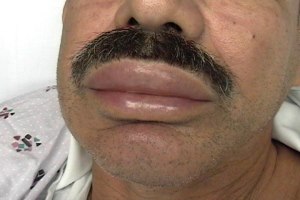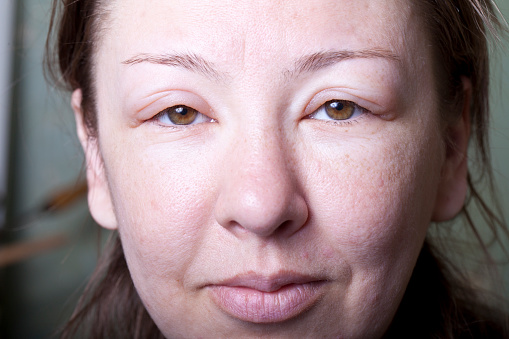Angioedema is swelling in the deep layers of the skin. It is often seen together with urticaria (hives). Angioedema many times occurs in soft tissues such as the eyelids, mouth or genitals. Angioedema is called "acute" if the condition lasts only a short time such as minutes to hours. Acute angioedema is commonly caused by an allergic reaction to medications or foods. Chronic recurrent angioedema is when the condition returns over a long period of time. It typically does not have an identifiable cause. Hereditary Angioedema (HAE) is a rare genetic condition. People with HAE either have a low level of an important protein (C1-INH) in their blood or this C1-INH protein does not function appropriately. These forms of hereditary angioedema are different than allergic angioedema. Allergic angioedema is skin reaction commonly associated with urticara (hives). Hereditary angioedema is a potentially life-threatening disorder caused by a genetic defect. ANGIOEDEMA (LIPS/FACE/BODY SWELLING) SPECIALIST

DR BENOIT TANO, MD PHD
Hereditary Angioedema (HAE)
Hereditary angiodema (HAE) is a rare, but serious genetic condition involving swelling in various body parts including the hands, feet, face, intestinal wall and airways. It does not respond to treatment with antihistamines or adrenaline so it is important to go see a specialist.What is Hereditary Angioedema?
Whare HAE Symptoms and Diagnosis?
The term “edema” means swelling. Hereditary angioedema causes painful episodes of swelling, typically in the face, hands, feet, or genitals. Dangerous swelling can also occur in the airways of the lungs or the intestinal walls. These symptoms can move from one place to another during the same episode.
Most episodes or attacks are difficult to predict, and triggers vary from person to person. These triggers may include anxiety, surgery, dental procedures, medications and illnesses such as colds and flu.
Many people have early warning signs of a HAE attack. For instance, extreme fatigue, a tingling of the skin, a hoarse voice or sudden mood changes may signal an oncoming episode.
Accurately diagnosing HAE can be difficult. Because the disease is rare, physicians often first rule out more common conditions with similar symptoms. In addition to a physical examination and medical history, HAE is diagnosed by measuring the level and function of C1-INH in the blood.
Living with HAE
Great strides have been made within the last decade to help manage this life-long condition. Your doctor may prescribe a medication to prevent attacks. There are also medications for treating HAE attacks. In addition to medications, the best approach to managing the disease is to be aware of your early warning signs and triggers that can provoke an attack. Recording information in a diary or journal will help you and your doctor develop a personalized management plan to empower you to lead a full life.

